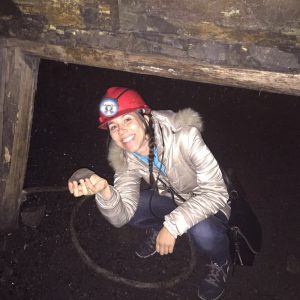
If you ask Alyssa Bowen, a PhD candidate in History, to tell you about her travels for her dissertation research, you better have some time on your hands: she’s visited Belgium, Chile, Cuba, France, Germany, Italy, the Netherlands, Spain, Switzerland, the United Kingdom, and the United States. For global historians like Bowen, it is not uncommon to visit archives on multiple continents to better understand processes that transcend nations or even regions.
“Almost any project within any region can become a global project, pretty much from the late eighteenth century forward, just because there are so many interconnections in the world by that point that are documented and that are relatively easy to document,” Mark Reeves, a PhD candidate and global historian, explained. “Rather than just asking why did x happen here, at this time period, [you] ask the question: how did events around the world at this time affect x and how did x affect other places around the world? I think it’s as much about the frame of reference, and to some extent assuming connection rather than assuming disconnection.”
As global historians, Reeves and Bowen focus on these interconnections. Reeves studies twentieth-century decolonization through the careers of four politicians in four different countries: the Philippines, Nigeria, India, and Syria. Bowen examines how global solidarity movements that opposed the Pinochet dictatorship in Chile transformed from radical, anti-imperialist movements into more human rights-oriented movements.
Global historians often focus on previously neglected connections, according to graduate student Samee Siddiqui. “What I’m doing, and what I think most global historians do, is look at the movement of ideas, people, technologies, interconnections— and so looking at global interconnectivity and looking outside of the nationalist frame, and also, I think, the Eurocentric frame,” Siddiqui said.
Siddiqui, who is still planning his dissertation research, will study twentieth-century Indian nationalist networks based in Tokyo and their interactions with Chinese, Filipino, and Vietnamese nationalist networks. Like his colleagues, Siddiqui must figure out how to narrow the long list of archives he could visit. Currently, he hopes to travel to archives in Japan, India, Pakistan, the United Kingdom, and possibly Hong Kong and Singapore.
To do their archival research, global historians often need to master multiple languages. Siddiqui will need to read not only English, but Urdu, Japanese, and possibly Arabic and Malay. Bowen’s work on Chilean solidarity movements has required proficiency in French, German, Italian, and Spanish.
Procuring funding to learn these languages can be a particular challenge for global history graduate students. Some global historians are able to secure Foreign Language and Area Studies (FLAS) grants from the U.S. federal government to support their language learning during the academic year. However, graduate students who are not U.S. citizens, like Siddiqui, are not eligible for this funding, and FLAS funds do not cover intensive summer language programs.
“Research is often more costly for global historians because we need to learn a lot of languages,” Bowen explained. “If we want to go to Middlebury College or another program for the summer and do training, it would be helpful to have funding for something like this.”
Global history’s broad scope also can pose particular intellectual challenges. “Something I learned from my M.A. thesis is that while the global framework is incredibly important for answering particular types of questions, it’s always a balance between [that framework and] getting a grip on the local,” Siddiqui said. “The best global history works I’ve read are excellent at looking at the global framework and global connections, and really teasing those out, but also never forgetting the importance of the local environment, local politics, local flavor.”
Professors in the Department of History have encouraged their students to pursue projects that answer important questions about global connections and processes, despite some of the challenges. “I can’t speak highly enough of my committee members,” Reeves said. “Susan Pennybacker and Cemil Aydin especially challenged me to broaden my horizons and think bigger. When I came in, I was looking at a much more constrained project, and both of them really encouraged me to go bigger, and not wall off those connections.”
Bowen is enthusiastic for the future of global history when she sees colleagues who do not identify as global historians increasingly look for global connections. “Since I started doing world or global history in my M.A. program in 2012, I’ve seen colleagues doing dissertations that have really used, even when they’re doing national histories, a very global approach. I think that’s encouraging.”
Aubrey Lauersdorf
